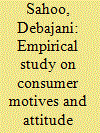| Srl | Item |
| 1 |
ID:
185715


|
|
|
|
|
| Summary/Abstract |
The present study empirically investigates the motives behind users’ attitude formation, behavioural intention, and word of mouth towards electric vehicles. An online survey was conducted among Indian youths who are currently using or potential users of electric vehicles. Data were collected by applying a multi-stage stratified sampling method. The structural equation modelling technique was applied to examine the hypothesized model and tested the proposed hypotheses. This study results show that while positive and social motives influence positive attitudes, the negative motives discourage and negatively affect electric vehicle adoption. The moderating impact of buyer involvement (high vs low) between motives and attitude was also tested. The study findings suggest that stakeholders can shape the motives through government policy and strategic action. Thus, this study provides directions that there is a need for subsidies and incentives, such as hassle-free registration at less cost, tax waive offs from central, state and local government, and also a strategic private-public partnership for infrastructure development to reduce negative motives and boost electric vehicles penetration.
|
|
|
|
|
|
|
|
|
|
|
|
|
|
|
|
| 2 |
ID:
192070


|
|
|
|
|
| Summary/Abstract |
The Protection of Constitutional Democracy Against Terrorist and Related Activities Amendment Act 23 of 2022 amends South Africa’s anti-terrorism legislation, the Protection of Constitutional Democracy Against Terrorist and Related Activities Act 33 of 2004, by, among other things, removing the requirement of motive from the definitional elements of the offence of terrorism. Before the amendment of the original legislation, motive was the third and final requirement to be satisfied before the intentional (and possibly even the negligent) commission of the various listed acts could officially constitute the offence of terrorism. This commentary sets out the detail of the three original elements of the offence of terrorism and ultimately exposes the major problem with the removal of the motive requirement, particularly if negligence is found to also be the envisaged form of fault. A solution which could help overcome the identified problem and sustain the removal of the motive requirement, is suggested in the commentary.
|
|
|
|
|
|
|
|
|
|
|
|
|
|
|
|
| 3 |
ID:
144915


|
|
|
|
|
| Summary/Abstract |
Japan has one of the world's largest and most diverse legal sex industries. In a limited female labor market, sex industry work is a stigmatized yet lucrative form of women's short-term employment and advertisements for recruiting new employees are prominently displayed across urban spaces associated with feminized consumption. In this article, I examine the ideological impasses that adult Japanese women working in Tokyo's sex industry express when talking about their motives for pursuing this work. Female sex workers commonly justify their work as the necessary sacrifice of filial daughters. This rhetoric of reluctant acceptance for the sake of others, however, obscures the reality that many sex workers are middle-class and college-educated women who find the financial opportunity and flexibility of this industry appealing in contrast to more dominant forms of feminized labor. These women express the ambivalence of their desires for economic self-sufficiency through narrating the dependence of others on them. Examining these ambivalences, I argue that sex workers’ motivations can only be understood through considering the ethical and moral frameworks that define the gendered economies in which they labor.
|
|
|
|
|
|
|
|
|
|
|
|
|
|
|
|